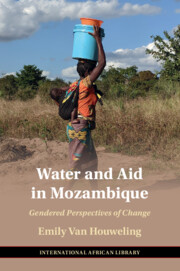Book contents
- Water and Aid in Mozambique
- The International African Library
- Water and Aid in Mozambique
- Copyright page
- Contents
- Figures
- Acknowledgements
- 1 Introduction
- 2 Divergent Development Discourses
- 3 Life before the Handpumps
- 4 Sustainability and Sense of Ownership
- 5 The Politics of Water Access
- 6 Gender Roles and Water Practices with the Handpumps
- 7 Development Encounters
- 8 Conclusions
- Glossary
- References
- Index
- Titles in the Series
3 - Life before the Handpumps
Published online by Cambridge University Press: 18 August 2022
- Water and Aid in Mozambique
- The International African Library
- Water and Aid in Mozambique
- Copyright page
- Contents
- Figures
- Acknowledgements
- 1 Introduction
- 2 Divergent Development Discourses
- 3 Life before the Handpumps
- 4 Sustainability and Sense of Ownership
- 5 The Politics of Water Access
- 6 Gender Roles and Water Practices with the Handpumps
- 7 Development Encounters
- 8 Conclusions
- Glossary
- References
- Index
- Titles in the Series
Summary
Chapter 3 explores the role of water in everyday life in rural Nampula before the handpumps were constructed. Based on my ethnographic data, I describe how water was used in social, ritual, and everyday contexts, and the meanings water acquired through these activities. I argue that water has much to teach us about culture and society: its flows illuminate economic systems, social values, gender roles, power dynamics, exchange networks, and a person’s status in society. I also describe how gender roles influence men’s and women’s water practices and shape notions of what it means to be a ‘good wife and mother’. My analysis devotes special attention to the experience of water collection and the social interactions that take place between women at the water site. This theme complicates the development narrative that water collection is oppressive to women and that customary water sites should be replaced by more modern ones. The rich connections between water, gender, and society are not seen or addressed in the dominant water planning models, which treat water as an economic good that can be ‘improved’ through technology.
- Type
- Chapter
- Information
- Water and Aid in MozambiqueGendered Perspectives of Change, pp. 54 - 87Publisher: Cambridge University PressPrint publication year: 2022

